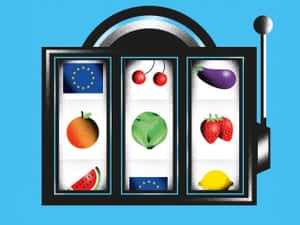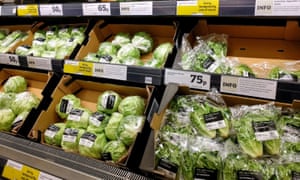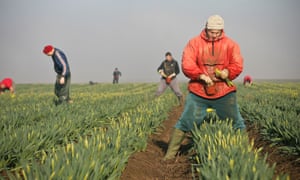
Illustration by Nathalie Lees
Felicity Lawrence in The Guardian
The UK’s clock has been set to Permanent Global Summer Time once more after a temporary blip. Courgettes, spinach and iceberg lettuce are back on the shelves, and the panic over the lack of imported fruit and vegetables has been contained. “As you were, everyone,” appears to be the message.
But why would supermarkets – which are said to have lost sales worth as much as £8m in January thanks to record-breaking, crop-wrecking snow and rainfall in the usually mild winter regions of Spain and Italy – be so keen to fly in substitutes from the US at exorbitant cost?
Why would they sell at a loss rather than let us go without, or put up prices to reflect the changing market? Why indeed would anyone air-freight watery lettuce across the whole of the American continent and the Atlantic when it takes 127 calories of fuel energy to fly just 1 food calorie of that lettuce to the UK from California?
The answer is that, in the past 40 years, a whole supermarket system has been built on the seductive illusion of this Permanent Global Summer Time. As a result, a cornucopia of perpetual harvest is one of the key selling points that big stores have over rival retailers. If the enticing fresh produce section placed near the front of each store to draw you in starts looking a bit empty, we might not bother to shop there at all.
But when you take into account climate change, the shortages of early 2017 look more like a taste of things to come than just a blip, and that is almost impossible for supermarkets to admit.
Add the impact of this winter’s weather on Mediterranean production, the inflationary pressures from a post-Brexit fall in the value of sterling against the euro, and the threat of tariffs as we exit the single market, and suddenly the model begins to look extraordinarily vulnerable.
I can remember the precise moment I first understood that we had been taken into this fantastical, nature-defying system without most of us really noticing. It was 1990 and I had been living and working with Afghan refugees in Pakistan’s North-West Frontier province for a long period. The bazaars where we bought our food were seasonal, and stocked from the immediate region. Back home on leave in the UK, I had that sense of dislocation that enables you to see your own culture as if from the outside. It was winter, but the supermarkets were full of fresh fruits and vegetables from around the world. The shelves looked wonderful, perfect, almost clinical, as though invented in a lab in my absence; but there was no smell. It was vaguely troubling in a way I couldn’t identify at the time.
Felicity Lawrence in The Guardian
The UK’s clock has been set to Permanent Global Summer Time once more after a temporary blip. Courgettes, spinach and iceberg lettuce are back on the shelves, and the panic over the lack of imported fruit and vegetables has been contained. “As you were, everyone,” appears to be the message.
But why would supermarkets – which are said to have lost sales worth as much as £8m in January thanks to record-breaking, crop-wrecking snow and rainfall in the usually mild winter regions of Spain and Italy – be so keen to fly in substitutes from the US at exorbitant cost?
Why would they sell at a loss rather than let us go without, or put up prices to reflect the changing market? Why indeed would anyone air-freight watery lettuce across the whole of the American continent and the Atlantic when it takes 127 calories of fuel energy to fly just 1 food calorie of that lettuce to the UK from California?
The answer is that, in the past 40 years, a whole supermarket system has been built on the seductive illusion of this Permanent Global Summer Time. As a result, a cornucopia of perpetual harvest is one of the key selling points that big stores have over rival retailers. If the enticing fresh produce section placed near the front of each store to draw you in starts looking a bit empty, we might not bother to shop there at all.
But when you take into account climate change, the shortages of early 2017 look more like a taste of things to come than just a blip, and that is almost impossible for supermarkets to admit.
Add the impact of this winter’s weather on Mediterranean production, the inflationary pressures from a post-Brexit fall in the value of sterling against the euro, and the threat of tariffs as we exit the single market, and suddenly the model begins to look extraordinarily vulnerable.
I can remember the precise moment I first understood that we had been taken into this fantastical, nature-defying system without most of us really noticing. It was 1990 and I had been living and working with Afghan refugees in Pakistan’s North-West Frontier province for a long period. The bazaars where we bought our food were seasonal, and stocked from the immediate region. Back home on leave in the UK, I had that sense of dislocation that enables you to see your own culture as if from the outside. It was winter, but the supermarkets were full of fresh fruits and vegetables from around the world. The shelves looked wonderful, perfect, almost clinical, as though invented in a lab in my absence; but there was no smell. It was vaguely troubling in a way I couldn’t identify at the time.

‘The shelves looked wonderful, perfect, almost clinical, as though invented in a lab in my absence; but there was no smell.’ Photograph: Alexander Britton/PA
Our food was not like this before the 1980s. The transformation was made possible by the third industrial revolution – the great leap in information technology and logistics that enabled retailers to dispense with keeping stock at the back of stores. Instead they were able to switch to minutely tuned, just-in-time electronic ordering from centralised distribution centres and to use the space freed up to extend their ranges from a typical 8,000 lines to 40,000, knocking out competition from all sorts of independent specialist shops as they did so.
The precursor to these new constantly replenished supply lines was our joining the European common market. Then with Spain, Portugal and Greece also joining in 1986, fresh territories from which to source opened up. European funds paid for fast new road networks across the Mediterranean, building the infrastructure for 44-tonne refrigerated trucks to whisk southern produce to northern Europe in the winter months, not just to the UK but to Germany and Scandinavia too. During the 90s there was a 90% increase in the movement of agricultural and food products between the UK and Europe.
Food writer Joanna Blythman coined the term Permanent Global Summer Time in an article for the Guardian in 2002. By then the astonishing shift in supply chains had come into sharp focus. Although the new supply system is miraculous in its scale, speed and efficiency, it has two fatal flaws.
First, it depends on the profligate use of finite resources – water, soil, and fossil fuels (with all their greenhouse gas emissions). Depending on whose figures you take, between a fifth and a third of UK emissions relate to food. More and more, we eat by exploiting the often fragile ecosystems of other countries. The UK is the sixth largest importer in the world of virtual water – the water needed to produce our food elsewhere.
Second, the system is built on the exploitation of cheap labour, mostly migrant, that has been socially disruptive and politically fraught. Migrant labour is not coincidental but structural to the just-in-time model, which needs the extreme flexibility of a class of desperate workers to function. Undocumented, underpaid migrants from Africa have provided the labour to harvest Italian and Spanish crops. Low-paid migrants, predominantly from eastern Europe, have become the backbone of the UK’s centralised distribution centres, providing 35% of food manufacturing labour, and 70-80% of harvesting labour.

‘Migrant labour is structural to the just-in-time model, which needs the extreme flexibility of a class of desperate workers to function.’ Photograph: Alamy Stock Photo
The brief disappearance of a few green and salad vegetables was hardly a great deprivation, but we should take it seriously as an early warning sign. Like the banking system, our food system seems too big, too sophisticated and too embedded in everyday life to fail. Yet privately, supermarket buyers have been talking for at least five years about “choice editing” – that is, editing out some of the fresh foods we have come to take for granted because importing them is unsustainable. Examples might include asparagus from Peru, 95% of which comes from the Ica valley where wells are running dry, and Moroccan tomatoes sourced from areas suffering severe water stress and aquifer depletion.
Supermarkets expected water shortages to bring the first jolts to the system. Brexit and climate change have brought other potential shocks to the fore.
The UK only produces a little over half of what its people consume; over a quarterof what we eat and drink comes from the EU. Reverting to more local ways of meeting our needs has become harder as the old infrastructure of regional wholesale markets has disappeared, and as farmers continue to exit the food business because they cannot make a living.
The government view, under the current Conservative administration and previous coalition and Labour ones, has been that the market will provide. In a new era of protectionism and with the UK heading out of the EU, that looks increasingly complacent. A decade ago, the Ministry of Defence predicted that changes to the climate, globalisation and global inequality would “touch the lives of everyone on the planet” within the next 20 years. “Food and water insecurity will drive mass migrations in the worst areas, but may also be possible in more affluent areas because of distribution problems, specialised agriculture and aggressive pricing … a succession of poor harvests may cause major price spikes resulting in significant economic and political turbulence,” a document warned.
Leaving the EU could be an opportunity for a radical rethink of the food system, but the government shows little sign of grasping it. So when I see glossy magazine pictures and Instagram snaps of summer dishes conjured up in the middle of winter of ingredients flown in from distant climes, I wonder if, a couple of decades from now, we will look to ourselves like the late Victorian colonials photographed proudly next to dead lions and other game in Africa. They could hardly have imagined they were consuming their world out of existence.